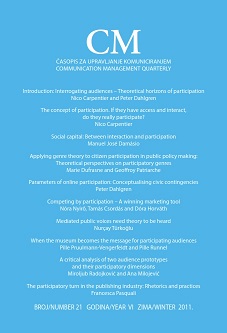Parameters of Online Participation: Conceptualising Civic Contingencies
Parameters of Online Participation: Conceptualising Civic Contingencies
Author(s): Peter DahlgrenSubject(s): Media studies, Social Theory, Social Informatics, Sociology of Politics
Published by: Fakultet političkih nauka Univerziteta u Beogradu
Keywords: participation; democracy; internet; citizens; civic engagement;
Summary/Abstract: The new online media obviously offer very impressive opportunities for participation. Yet, we need to specify more carefully what we mean by participation, and try to illuminate its key elements. Thus, after first presenting some overarching, scene-setting perspectives on participation and digital media, this presentation offers five basic parameters of participation, a conceptual framework intended to be empirically useful. The five are: trajectories, modalities, motivations, sociality and visibility. Each parameter has some further subcategories; for example, I suggest three basic trajectories: consumption, civil society and politics. These obviously are entangled with each other in the real world, yet the distinctions allow us to focus on political participation as a specific form. To what extent and how participation is realised depends on many factors. Here I highlight the notion of contingency, underscoring the point that a complex interplay of conditions and circumstances both make possible and delimit political participation. I look at three sets of contingencies: institutional features of online media (illustrated with a brief look at Google), attributes of the mainstream online environments that have a clear hegemonic character, and established social patterns of use that can also impact on this environment. For the latter, I highlight what I call the solo sphere as an emerging feature of online political participation – the tendency towards isolated, individualised communication. I then run these three types of contingencies across the five parameters to arrive at a preliminary perspective on how the online environment both facilitates and defects political participation of the non-mainstream kind.
Journal: CM Komunikacija i mediji
- Issue Year: 6/2011
- Issue No: 21
- Page Range: 87-109
- Page Count: 23
- Language: English

